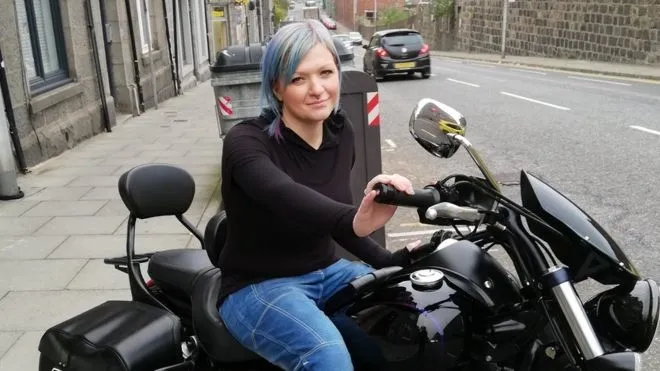He stopped taking the insulin dose he needed and put his life at risk.
"I'm still alive and I still keep my feet. They are two of the most important things for me considering the damage I could have done to myself."
Becky Rudkin, one of the protagonists of "Diabulimia: the most dangerous eating disorder in the world", a Newsbeat and BBC Three documentary transmitted in 2017.
The term, a combination of diabetes and bulimia, is used to describe people with type 1 diabetes that deliberately take very little insulin to try to control their weight.
"Do not inject the insulin is addictive, because you can eat what you want and at the same time lose weight," explains Gemma, 22, diagnosed with type 1 diabetes when I was 12 years old.
It is not a medically recognized condition, but in the United Kingdom a financing of more than US $ 1.5 million has just been approved in the hope that scientists can develop an effective treatment plan for people with this eating disorder.
jump the recommendations
In the case of Becky, 30, insulin suppression caused the bones of his foot to disintegrate.
"They amputated my leg because I did not attend my diabetes," "The surgeon told me that they were made porridge," he says.
But in the most serious cases the diabulimia can cause cardiac stoppages and even death.
For now, after 16 months in a unit of eating disorders, Becky no longer has to use crutches or go to sessions with his mental health team.
The Scottish young woman is excited for her future and tells the Newsbeat radio program that she has promised her boyfriend, she has moved to live with her, and now she has a dog.
serious disorders
Diabulimia occurs in patients with type 1 diabetes, which are afraid because the insulin they need causes weight gain.
But not use it, increases its blood sugar level, which is associated with serious health disorders: blindness, permanent damage to kidneys or damage to the nervous system.
Becky has promised her boyfriend, Joe, and are preparing her wedding for the month of July.
"Not following insulin treatment can cause death quickly," warns Dr. Khalida Ismail, a psychiatrist specializing in diabetes.
It is a very dangerous disorder because it is associated with a chronic disease that will accompany the patient throughout his life.
"You have to fight with both diseases at the same time," recalls Nabelah, another 22 -year -old patient.
seeking treatment
The Team of Clinical Scientist Marietta Stadler, who works at the King's College Hospital in London, will receive 1.5 million dollars to carry out an investigation into diabulimia.
She and her team will use that scholarship to try to better understand diabetes and conduct interviews with people who have the disease.
Marietta Stadler clinical scientist, who works at the King's College Hospital in London, hopes to design an effective treatment for diabulimia patients.
"We cannot rely only on a group of doctors who decide an intervention, we must have the testimony of the people who have lived with this," explains Stadler.
Research is expected to take five years and the current plan is to prepare a 12 module treatment plan with a session every fifteen days for six months for patients with diabulimia.
The financing has been granted by the National Institute of Health Research of the United Kingdom (NIHR), which is the one who decides to grant money to research projects that have a "clear benefit for patients."
Becky states that "it is alreadyTime "of carrying out a study of these characteristics, but is also worried.
The last time Becky entered the Hopital was on the verge of death.
"We are all different and we all treat our own diabulimia and diabetes in a completely different way. So I suppose that is the point that could be difficult when finding a treatment.
"What can you do in 12 sessions with someone who has diabetes? You can only scratch the surface. I don't know if a biweekly meeting is enough," he says.
But Dr. Stadler says that research is only the "first step" and after five years of financing, a larger essay will be needed before adopting a formal treatment plan in the public health service.


